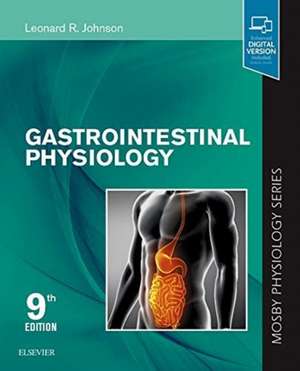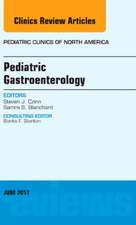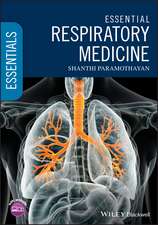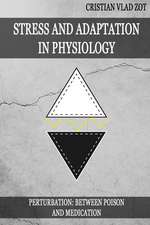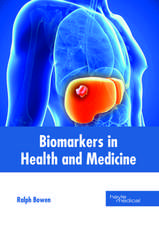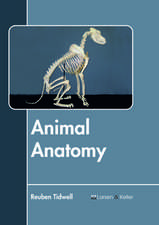Gastrointestinal Physiology: Mosby Physiology Series: Mosby's Physiology Monograph
Autor Leonard R. Johnsonen Limba Engleză Paperback – 16 noi 2018
Preț: 200.61 lei
Preț vechi: 277.05 lei
-28% Nou
38.39€ • 39.93$ • 31.69£
Carte disponibilă
Livrare economică 17-31 martie
Livrare express 08-14 martie pentru 93.67 lei
Specificații
ISBN-10: 0323595634
Pagini: 176
Ilustrații: 89 illustrations (89 in full color)
Dimensiuni: 191 x 235 x 15 mm
Greutate: 0.39 kg
Ediția:9
Editura: Elsevier
Seria Mosby's Physiology Monograph
Cuprins
Chapter 1 Regulation: Peptides of the Gastrointestinal Tract
Objectives
General Characteristics
Discovery
Chemistry
Distribution and Release
Actions and Interactions
Candidate Hormones
Neurocrines
Paracrines
Clinical Applications
Clinical Tests
Summary
Key Words and Concepts
Chapter 2 Regulation: Nerves and Smooth Muscle
Objectives
Anatomy of the Autonomic Nervous System
Neurohumoral Regulation of Gastrointestinal Function
Anatomy of the Smooth Muscle Cell
Smooth Muscle Contraction
Summary
Key Words and Concepts
Chapter 3 Swallowing
Objectives
Chewing
Pharyngeal Phase
Esophageal Peristalsis
Receptive Relaxation of the Stomach
Clinical Applications
Clinical Tests
Summary
Key Words and Concepts
Chapter 4 Gastric Emptying
Objectives
Anatomic Considerations
Contractions of the Orad Region of the Stomach
Contractions of the Caudad Region of the Stomach
Contractions of the GastroduodenalJunction
Contractions of the Proximal Duodenum
Regulation of Gastric Emptying
Clinical Applications
Clinical Tests
Summary
Key Words and Concepts
Chapter 5 Motility of the Small Intestine
Objectives
Anatomic Considerations
Types of Contractions
Patterns of Contractions
Vomiting
Clinical Applications
Clinical Tests
Summary
Key Words and Concepts
Chapter 6 Motility of the Large Intestine
Objectives
Anatomic Considerations
Contractions of the Cecum and Ascending Colon
Contractions of the Descending and Sigmoid Colon
Motility of the Rectum and Anal Canal
Control of Motility
Clinical Significance
Clinical Tests
Summary
Key Words and Concepts
Chapter 7 Salivary Secretion
Objectives
Functions of Saliva
Anatomy and Innervation of the Salivary Glands
Composition of Saliva
Regulation of Salivary Secretion
Clinical Correlation
Summary
Key Words and Concepts
Chapter 8 Gastric Secretion
Objectives
Functional Anatomy
Secretion of Acid
Origin of the Electrical Potential Difference
Electrolytes of Gastric Juice
Stimulants of Acid Secretion
Stimulation of Acid Secretion
Inhibition of Acid Secretion
Pepsin
Mucus
Intrinsic Factor
Growth of the Mucosa
Clinical Applications
Summary
Key Words and Concepts
Chapter 9 Pancreatic Secretion
Objectives
Functional Anatomy
Mechanisms of Fluid and Electrolyte Secretion
Mechanisms of Enzyme Secretion
Regulation of Secretion
Cellular Basis for Potentiation
Response to a Meal
Clinical Applications
Summary
Key Words and Concepts
Chapter 10 Bile Secretion and Gallbladder Function
Objectives
Overview of the Biliary System
Constituents of Bile
Bile Secretion
Gallbladder Function
Expulsion of Bile
Clinical Applications
Clinical Tests
Summary
Key Words and Concepts
Chapter 11 Digestion and Absorption OF NUTRIENTS
Objectives
Structural-Functional Associations
Digestion
Absorption
Adaptation of Digestive and Absorptive Processes
Carbohydrate Assimilation
Protein Assimilation
Lipid Assimilation
Vitamins
Summary
Key Words and Concepts
Chapter 12 Fluid and Electrolyte Absorption
Objectives
Bidirectional Fluid FluX
Ionic Content of Luminal Fluid
Transport Routes and Processes
Mechanism for Water Absorption and Secretion
Intestinal Secretion
Clinical Applications
Calcium Absorption
Iron Absorption
Summary
Key Words and Concepts
Chapter 13 Regulation of Food Intake
Objectives
Appetite Control
The Nervous System
The Endocrine System
The Gastrointestinal System
Clinical Applications
Summary
Key Words and Concepts
Appendix A Answer to Self-Study Problems
Appendix B Comprehensive Multiple-Choice Review Examination
Index
Descriere
Gain a foundational understanding of gastrointestinal physiology and how the GI system functions in health and disease. Gastrointestinal Physiology, a volume in the Mosby Physiology Series, explains the fundamentals of this complex subject in a clear and concise manner, while helping you bridge the gap between normal function and disease with pathophysiology content throughout the book.
